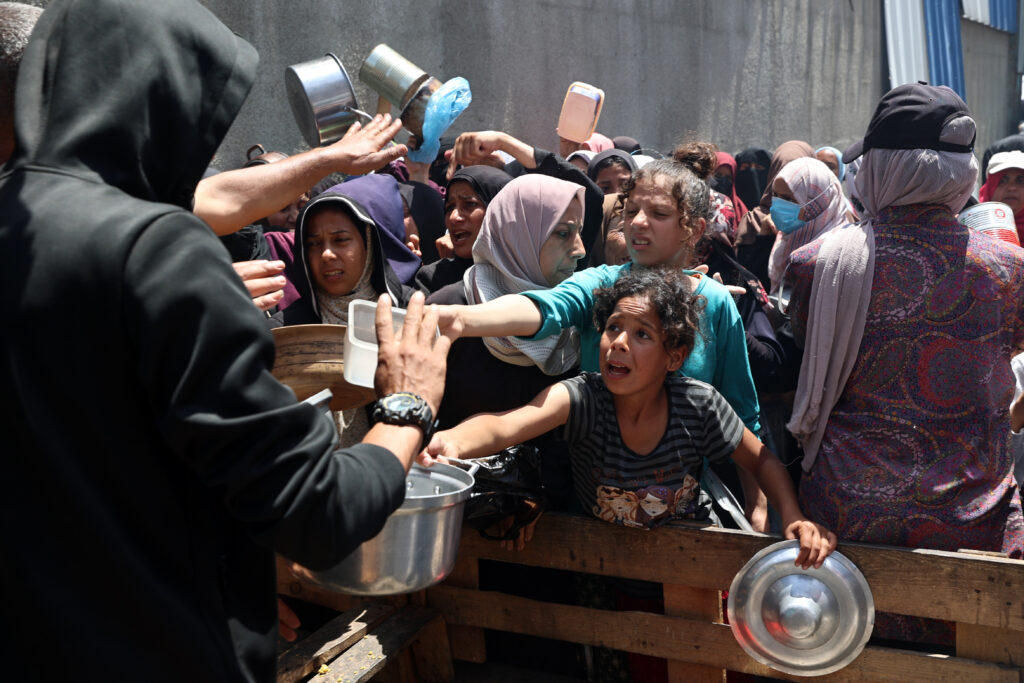AFP Asia Business
Trump hails Air Force One ‘gift’ after Qatari luxury jet reports
Donald Trump on Sunday defended plans to receive a new Air Force One as a gift, after reports he will accept a luxury Boeing jet from Qatar despite strict rules on presents for US presidents.Calling the plane a “flying palace,” ABC News, which first reported the story, said the Boeing 747-8 jumbo jet gifted from the Qatari royal family would possibly be the most expensive gift ever received by the American government.The controversy around the jet — and Trump’s boast that it was coming “free of charge” — builds on questions the US leader is facing over potential conflicts of interest with his family businesses and use of public office.In a social media post late Sunday that made no mention of Qatar, Trump went on the offensive to claim the plane was a temporary “gift” that would go to the Defence Department, and would replace an existing four-decade-old model.Trump, 78, said the process was unfolding as a “transparent transaction” but did not specify whether any party was receiving something in return, and instead blamed Democrats for wanting to cash out on a new Air Force One unnecessarily.Qatar swiftly sought to downplay the uproar, saying reports describing the jet as a gift “are inaccurate.”- Ethical, legal questions -“The possible transfer of an aircraft for temporary use as Air Force One is currently under consideration between Qatar’s Ministry of Defense and the US Department of Defense,” said Ali Al-Ansari, Qatar’s media attache to Washington, stressing that no decision had been made.The US Constitution prohibits government officials from accepting gifts “from any King, Prince or foreign State,” in a section known as the emoluments clause.But Trump would skirt the law by handing the jet to his presidential library after he leaves office.The plan is to be announced as Trump travels to three Middle East countries this week, including Qatar, reported ABC and The New York Times.Acceptance of the gift has raised ethical questions from both sides of the political aisle as it appears to flout laws set up to stanch government corruption.Laura Loomer, a far-right ally of Trump, said accepting Qatar’s plane would be a “stain” on the administration.”We cannot accept a $400 million ‘gift’ from jihadists in suits,” she posted on X. “The Qataris fund the same Iranian proxies in Hamas and Hezbollah who have murdered US Service Members.”The White House and Department of Justice, however, believe the gift is legal and not a bribe because it is not given in exchange for any particular favor or action, sources told ABC.And it is not unconstitutional, they say, because it will first be passed to the US Air Force before being turned over to the presidential library, thereby never being gifted to an individual.- ‘Wildly illegal’ -The Democratic National Committee said the move was proof of Trump using the White House for personal financial gain.”While working families brace for higher costs and empty shelves, Trump is still focusing on enriching himself and his billionaire backers,” the DNC said in an email to supporters.Multiple Democratic lawmakers blasted the plan.Senator Chris Murphy called it “wildly illegal,” while Representative Kelly Morrison said such a gift amounts to “corruption in plain sight” and an unethical, unconstitutional “bribe.”The US president has long been unhappy with the Air Force One jets — two highly customized Boeing 747-200B series aircraft.Earlier this year Trump said his administration was “looking at alternatives” to Boeing following delays in the delivery of two new models.The aerospace giant agreed in 2018 to supply two 747-8 aircraft by the end of 2024 for $3.9 billion — both ready to transport whoever occupied the White House at that time.But a subcontractor went bankrupt and the coronavirus pandemic disrupted production, forcing Boeing to push back delivery to 2027 and 2028.Although the plane the Qataris are offering is reportedly over 10 years old, a new Boeing 747-8 costs around $400 million, experts said.The aircraft must additionally be outfitted with extensive communications and security upgrades before it becomes Air Force One.
Chinese EV battery giant CATL aims to raise $4 bn in Hong Kong IPO
Chinese EV battery giant CATL aims to raise $4 billion in its Hong Kong listing scheduled for May 20, said a statement filed to the bourse Monday, making it the largest IPO expected in the city so far this year.A global leader in the sector, CATL produces more than a third of all electric vehicle …
Chinese EV battery giant CATL aims to raise $4 bn in Hong Kong IPO Read More »
Hamas to release hostage as part of direct Gaza talks with US
Hamas said it would release a US-Israeli hostage held in Gaza as the group revealed it was engaged in direct talks with the United States towards a ceasefire in the war-battered territory.”Israeli soldier Edan Alexander, a dual US national, will be released as part of efforts towards a ceasefire” and the reopening of aid crossings, the Palestinian militant group said in a statement.The family of 21-year-old Alexander said they had been informed that he might be released “in the coming days”.US President Donald Trump hailed the “monumental news” in a post on social media, describing it as a “good faith gesture”. “Hopefully this is the first of those final steps necessary to end this brutal conflict,” he added.In a joint statement Egypt and Qatar, who along with the US have mediated talks between Hamas and Israel, also welcomed the development as a “a gesture of goodwill and an encouraging step toward a return to the negotiating table”.Earlier, two Hamas officials told AFP that talks were ongoing in the Qatari capital of Doha with the United States and reported “progress” had been made.Israeli strikes meanwhile continued, with Gaza’s civil defence agency reporting that at least 12 people were killed on Sunday including four young children.One Hamas official, speaking of the talks with the United States, said there was “progress made… notably on the entry of aid to the Gaza Strip” and the potential exchange of hostages for Palestinian prisoners in Israeli custody.A second official also reported progress “on the ceasefire in the Gaza Strip”.Israel again vowed to keep fighting despite the talks.The office of Israeli Prime Minister Benjamin Netanyahu said that any future “negotiations will take place under fire with a commitment to achieving all the objectives of the war”.- Post-war administration -Gaza militants hold 58 hostages seized during Hamas’s October 7, 2023 attack on Israel that triggered the war, including 34 the Israeli military says are dead.Israel ended the last ceasefire, which lasted two months, on March 18, launching a major offensive in Gaza and ramping up its bombardment of the territory.It has also cut off all aid to Gaza, saying it would pressure Hamas to release the remaining hostages.Indirect talks between Hamas and Israel, mediated by Qatar, Egypt and the United States, have taken place from the early months of the war without bringing it to an end.Washington had for decades refused publicly to engage directly with Hamas, which it labels a terrorist organisation, before first doing so in March.Hamas has continued to insist on a deal that ends the war and on April 18 rejected an Israeli proposal for a 45-day truce and hostage-prisoner exchange.In its statement on Sunday, the group said it was willing to “immediately begin intensive negotiations” that could lead to an agreement to end the war and would see Gaza under a technocratic and independent administration.”This will ensure calm and stability for many years, along with reconstruction and the end of the blockade,” it said.Earlier this month, the Israeli government approved plans to expand its offensive in the Gaza Strip, with officials talking of retaining a long-term presence there.- Aid plan -Despite the talks, the war in the devastated Palestinian territory raged on.Mahmud Bassal, spokesman for the civil defence agency, told AFP that Israeli jets had hit three tents housing displaced people in the southern city of Khan Yunis. AFP footage showed rescuers working in the dark, evacuating a wounded baby from the site of the strike as well as two bodies, one of them in a white plastic bag and another wrapped in a blanket.A separate strike on Khan Yunis killed three people, Bassal said, while another was killed in Gaza City.The Israeli military did not comment on any specific incidents but said its air force had struck “more than 50 terror targets across the Gaza Strip” since Saturday.While ceasefire negotiations have yet to produce a breakthrough, Israel’s foreign minister, Gideon Saar, on Sunday “fully” endorsed a US plan to restore aid to Gaza, under a complete blockade since March 2.The plan has drawn hefty international criticism for sidelining the United Nations and existing aid organisations, with the UN’s agency for Palestinian refugees, UNRWA, saying it was “impossible” to replace it in Gaza.Hamas’s 2023 attack on southern Israel resulted in the deaths of 1,218 people, mostly civilians, according to an AFP tally based on official figures.The health ministry in Hamas-run Gaza said on Sunday that at least 2,720 people have been killed since Israel resumed its campaign, bringing the overall death toll since the war broke out to 52,829.burs-jj/giv/fec/dhc
Trump to accept lavish jet from Qatar as Air Force One: reports
Donald Trump plans to accept a luxury Boeing jet from the Qatari royal family for use as Air Force One and then continue flying in it after his tenure, despite strict rules on US presidential gifts, media reported Sunday.Calling the plane a “flying palace,” ABC News, which first reported the story, said the Boeing 747-8 jumbo jet would possibly be the most expensive gift ever received by the American government.Qatar swiftly sought to downplay the uproar, saying reports describing the jet as a gift “are inaccurate.””The possible transfer of an aircraft for temporary use as Air Force One is currently under consideration between Qatar’s Ministry of Defense and the US Department of Defense,” said Ali Al-Ansari, Qatar’s media attache to Washington, stressing that no decision had been made.The US Constitution prohibits government officials from accepting gifts “from any King, Prince or foreign State,” in a section known as the emoluments clause.But Trump would skirt the law by handing the jet to his presidential library after he leaves office.The plan is to be announced as Trump travels to three Middle East countries this week, including Qatar, reported ABC and The New York Times.Acceptance of the gift has raised ethical questions from both sides of the political aisle as it appears to flout laws set up to stanch government corruption.Laura Loomer, a far-right ally of Trump, said accepting Qatar’s plane would be a “stain” on the administration.”We cannot accept a $400 million ‘gift’ from jihadists in suits,” she posted on X. “The Qataris fund the same Iranian proxies in Hamas and Hezbollah who have murdered US Service Members.”The White House and Department of Justice, however, believe the gift is legal and not a bribe because it is not given in exchange for any particular favor or action, sources told ABC.And it is not unconstitutional, they say, because it will first be passed to the US Air Force before being turned over to the presidential library, thereby never being gifted to an individual.The White House did not immediately respond to an AFP request for comment.- ‘Wildly illegal’ -The Democratic National Committee said the move was proof of Trump using the White House for personal financial gain.”While working families brace for higher costs and empty shelves, Trump is still focusing on enriching himself and his billionaire backers,” the DNC said in an email to supporters.Multiple Democratic lawmakers blasted the plan.Senator Chris Murphy called it “wildly illegal,” while Representative Kelly Morrison said such a gift amounts to “corruption in plain sight” and an unethical “bribe” forbidden by the US Constitution.Trump reportedly toured the Qatari-owned jet in February when it was parked at the Palm Beach International Airport.The US president has long been unhappy with the Air Force One jets — two highly customized Boeing 747-200B series aircraft.Earlier this year Trump said his administration was “looking at alternatives” to Boeing following delays in the delivery of two new models.The aerospace giant agreed in 2018 to supply two 747-8 aircraft by the end of 2024 for $3.9 billion — both ready to transport whoever occupied the White House at that time.But a subcontractor went bankrupt and the coronavirus pandemic disrupted production, forcing Boeing to push back delivery to 2027 and 2028.Although the plane the Qataris are offering is reportedly over 10 years old, a new Boeing 747-8 costs around $400 million, experts said.The aircraft must additionally be outfitted with extensive communications and security upgrades before it becomes Air Force One.



